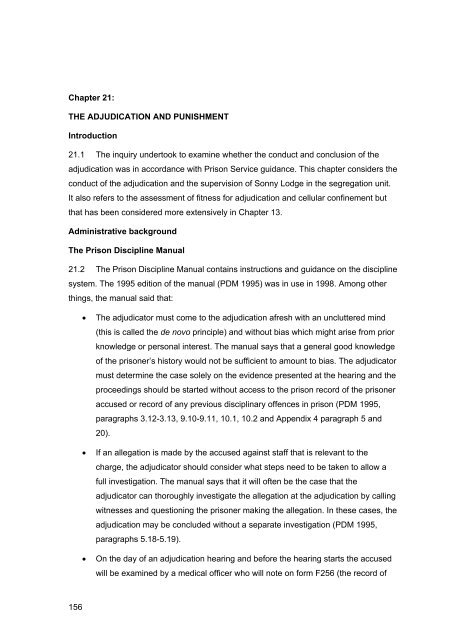Report of the Inquiry into the circumstances of the Death of Bernard ...
Report of the Inquiry into the circumstances of the Death of Bernard ...
Report of the Inquiry into the circumstances of the Death of Bernard ...
You also want an ePaper? Increase the reach of your titles
YUMPU automatically turns print PDFs into web optimized ePapers that Google loves.
Chapter 21:<br />
THE ADJUDICATION AND PUNISHMENT<br />
Introduction<br />
21.1 The inquiry undertook to examine whe<strong>the</strong>r <strong>the</strong> conduct and conclusion <strong>of</strong> <strong>the</strong><br />
adjudication was in accordance with Prison Service guidance. This chapter considers <strong>the</strong><br />
conduct <strong>of</strong> <strong>the</strong> adjudication and <strong>the</strong> supervision <strong>of</strong> Sonny Lodge in <strong>the</strong> segregation unit.<br />
It also refers to <strong>the</strong> assessment <strong>of</strong> fitness for adjudication and cellular confinement but<br />
that has been considered more extensively in Chapter 13.<br />
Administrative background<br />
The Prison Discipline Manual<br />
21.2 The Prison Discipline Manual contains instructions and guidance on <strong>the</strong> discipline<br />
system. The 1995 edition <strong>of</strong> <strong>the</strong> manual (PDM 1995) was in use in 1998. Among o<strong>the</strong>r<br />
things, <strong>the</strong> manual said that:<br />
156<br />
The adjudicator must come to <strong>the</strong> adjudication afresh with an uncluttered mind<br />
(this is called <strong>the</strong> de novo principle) and without bias which might arise from prior<br />
knowledge or personal interest. The manual says that a general good knowledge<br />
<strong>of</strong> <strong>the</strong> prisoner’s history would not be sufficient to amount to bias. The adjudicator<br />
must determine <strong>the</strong> case solely on <strong>the</strong> evidence presented at <strong>the</strong> hearing and <strong>the</strong><br />
proceedings should be started without access to <strong>the</strong> prison record <strong>of</strong> <strong>the</strong> prisoner<br />
accused or record <strong>of</strong> any previous disciplinary <strong>of</strong>fences in prison (PDM 1995,<br />
paragraphs 3.12-3.13, 9.10-9.11, 10.1, 10.2 and Appendix 4 paragraph 5 and<br />
20).<br />
If an allegation is made by <strong>the</strong> accused against staff that is relevant to <strong>the</strong><br />
charge, <strong>the</strong> adjudicator should consider what steps need to be taken to allow a<br />
full investigation. The manual says that it will <strong>of</strong>ten be <strong>the</strong> case that <strong>the</strong><br />
adjudicator can thoroughly investigate <strong>the</strong> allegation at <strong>the</strong> adjudication by calling<br />
witnesses and questioning <strong>the</strong> prisoner making <strong>the</strong> allegation. In <strong>the</strong>se cases, <strong>the</strong><br />
adjudication may be concluded without a separate investigation (PDM 1995,<br />
paragraphs 5.18-5.19).<br />
On <strong>the</strong> day <strong>of</strong> an adjudication hearing and before <strong>the</strong> hearing starts <strong>the</strong> accused<br />
will be examined by a medical <strong>of</strong>ficer who will note on form F256 (<strong>the</strong> record <strong>of</strong>
















